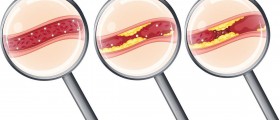
Hormone replacement therapy or HRT is a medical treatment for women which prevents significant discomfort during perimenopause, menopause and, to some extent, postmenopause. Many problems and conditions in these periods of life have been associated with lack of estrogen and progesterone hormones in female body, so the idea was to use these hormones and replace them when needed.
HRT was supposed to be used as a means of prevention, rather than the treatment for the already existing condition. Doctors needed to know potential benefits from this treatment and there were several different studies dedicated to this matter. These clinical studies involved women with or without heart disease and previous stroke who used hormone replacement therapy for some time.
About Atherosclerosis
Atherosclerosis is a disease of arteries, characterized by accumulation of plaque in the walls of these blood vessels. As a result of accumulated plaque, blood vessels can harden and become very narrow, affecting the blood flow and leading to formation of blood clots. Atherosclerosis is, therefore, considered to be one of the major causes of heart attack, coronary artery disease and stroke. This being said, doctors treating women with HRT needed to know whether these drugs affect women’s health and cause atherosclerosis diseases.HRT Clinical Studies and ResultsAs mentioned above, clinical studies about the use and potential health problems associated with HRT treatment included both women with and without any heart disease and stroke.
The ERA (Estrogen Replacement and Atherosclerosis) study involved estrogen and the combination of estrogen and progestin treatment on women with heart disease. According to the results, there was no difference in atherosclerosis progression in women who used hormone replacement therapy (either estrogen or estrogen/progestin) and those who used placebo.
Some other randomized controlled studies showed that there was no decrease of stroke risk after 3 years of treatment with estrogen and no prevention from recurrent heart diseases or AVC (aortic valve calcification) in women using estrogen or the combination of estrogen and progestin.
Women’s Health Initiative (WHI) study included 16.000 women, 50 to 79 years of age who had not had hysterectomy. The study was stopped before the end of this trial, because small percent of patients (8 in 10.000 women) developed invasive breast cancer. Additional reports included increased risk of blood clots, heart attack, stroke and lethal consequences because of cardiovascular diseases. Long term use of hormone replacement therapy (the combination of estrogen and progestin for longer than 5 years) has been proven to significantly increase the risk for development of breast cancer.
Scientists and doctors concluded that HRT caused more harm than benefits, since there were many side effects associated with the use of this hormone replacement treatment. When deciding whether they want to use HRT for a short period of time (few years) women should think about side effects, including possible heart attack and stroke.

















Your thoughts on this
Loading...